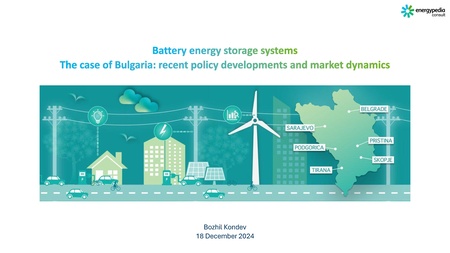Difference between revisions of "Battery energy storage systems: The case of Bulgaria: recent policy developments and market dynamics"
***** (***** | *****) m |
***** (***** | *****) |
||
| (2 intermediate revisions by one other user not shown) | |||
| Line 1: | Line 1: | ||
<div class="BALKAN">{{back button|Western_Balkan_Power_Sector|Back to Western Balkan Power Sector Start Page}} | <div class="BALKAN">{{back button|Western_Balkan_Power_Sector|Back to Western Balkan Power Sector Start Page}} | ||
| − | == Webinar | + | == Webinar Summary == |
| − | + | On December 18, 2024 the GIZ regional project "Green Agenda: Decarbonization of the Electricity Sector in the Western Balkans" organized a webinar as part of a series of events aimed at facilitating knowledge exchange among project partners and sharing experiences about power sector developments in the region. The specific topic of the webinar was related to battery energy storage systems in Bulgaria. Around 40 energy experts representing the energy ministries, transmission system operators, distribution system operators, regulatory authorities, and energy companies from all the Western Balkan countries participated at the event. | |
| − | + | After a short welcome, the session started with a brief introduction of the project's knowledge sharing and peer exchange tools - the Western Balkans Power Sector Knowledge Hub and the LinkedIn group for energy sector experts from the Western Balkans. After a short introduction to energypedia, the platform hosting the dedicated knowledge hub, the specifics of the hub were presented to the audience. The LinkedIn group and the plans for engaging users were also introduced. | |
| − | + | The second presentation gave a detailed introduction to the evolving renewable energy landscape in Bulgaria. The presentation outlined the recent developments in the power sector in the country and the rapid growth in renewable energy capacity. Details about Bulgaria's experiences with pumped hydropower, the policy framework for battery energy storage systems and some project examples were also shared with the participants. The presentation closed with a brief account of the outlook for battery energy storage systems in Bulgaria. | |
| − | + | After the presentation, the moderator engaged with the audience on their assessment of the status of battery energy storage in their countries and the outlook for the sector. While several participants assessed the current situation in their countries as "poor", "challenging", some saw the sector as "progressing" and mentioned "opportunities". Some participants also mentioned specific barriers such as "lack of legislation" and "no vision". In the Q&A session, one participant from Bosnia & Herzegovina shared insights from the situation in their country and mentioned that the legislation to be in order and that some BESS projects are currently starting. | |
| − | |||
| − | |||
== Presentations == | == Presentations == | ||
Revision as of 09:48, 6 January 2025
Webinar Summary
On December 18, 2024 the GIZ regional project "Green Agenda: Decarbonization of the Electricity Sector in the Western Balkans" organized a webinar as part of a series of events aimed at facilitating knowledge exchange among project partners and sharing experiences about power sector developments in the region. The specific topic of the webinar was related to battery energy storage systems in Bulgaria. Around 40 energy experts representing the energy ministries, transmission system operators, distribution system operators, regulatory authorities, and energy companies from all the Western Balkan countries participated at the event.
After a short welcome, the session started with a brief introduction of the project's knowledge sharing and peer exchange tools - the Western Balkans Power Sector Knowledge Hub and the LinkedIn group for energy sector experts from the Western Balkans. After a short introduction to energypedia, the platform hosting the dedicated knowledge hub, the specifics of the hub were presented to the audience. The LinkedIn group and the plans for engaging users were also introduced.
The second presentation gave a detailed introduction to the evolving renewable energy landscape in Bulgaria. The presentation outlined the recent developments in the power sector in the country and the rapid growth in renewable energy capacity. Details about Bulgaria's experiences with pumped hydropower, the policy framework for battery energy storage systems and some project examples were also shared with the participants. The presentation closed with a brief account of the outlook for battery energy storage systems in Bulgaria.
After the presentation, the moderator engaged with the audience on their assessment of the status of battery energy storage in their countries and the outlook for the sector. While several participants assessed the current situation in their countries as "poor", "challenging", some saw the sector as "progressing" and mentioned "opportunities". Some participants also mentioned specific barriers such as "lack of legislation" and "no vision". In the Q&A session, one participant from Bosnia & Herzegovina shared insights from the situation in their country and mentioned that the legislation to be in order and that some BESS projects are currently starting.
Presentations
Western Balkan Power Sector Knowledge Hub
This presentation gives a brief introduction to the knowledge sharing and peer exchange tools of the GIZ project: the Western Balkan Power Sector Knowledge Hub and a LinkedIn group for energy sector experts from partner organisations. It introduces the energypedia platform, a wiki for renewable energy, energy access and energy efficiency, and gives a brief overview of wikis in general, the history of energypedia and the kind of content it offers. The presentation then spotlights the dedicated Western Balkans Energy Sector Knowledge Hub and the project resources and country energy situation information it provides to sector professionals to support knowledge sharing in the Western Balkans. The presentation also introduces the LinkedIn group created for GIZ project partners to support peer exchange, networking and regional dialogue. It invites participants to join the group and share knowledge, expertise and sector-related information.
Battery energy storage system - The case of Bulgaria: recent policy developments and market dynamics






















